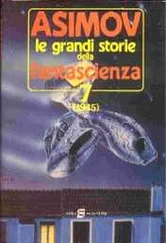“That all?” Vic asked.
Flavin nodded. Vic’s fist caught him in the mouth, spilling him onto the floor. The politician lay there, feeling his jaw and staring up at Vic. Then the anger was gone, and Vic reached down to help him up.
“You’re half a decent guy and half a louse,” Vic told him. “You had that coming, but I should have used it on some of the real lice around. Besides, maybe you have part of an idea.”
“All right, no teeth lost—just the first cigar I’ve enjoyed in days.” Flavin rubbed his jaw, then grinned ruefully. “I should have known how you feel. I just happen to believe in Earth first. What’s this big idea of yours?”
“Getting our air through other planets. Our air. It’s a routing job. If we can set up a chain so the air going out of one transmitter in a station is balanced by air coming from another in the same station, there’d be a terrific draft. But most of it would be confined in the station, and there wouldn’t be the outside whirlwind to keep us from getting near. Instead of a mad rush of air in or out of the building, there’d be only eddy currents outside of the inner chamber. We’d keep our air, and maybe have time to figure out some way of getting at that hunk of glass.”
“Won’t work,” Flavin said gloomily. “Suppose Wilkes was asked to route through for another planet. He’d have to turn it down. Too much risk.”
“That’s where Pat gave me the tip. Engineers get used to thinking of each other as engineers instead of competing races—they have to work together. They have the same problems and develop the same working habits. If I were running a station and the idea was put to me, I’d hate to turn it down, and I might not think of the political end. I’ve always wanted to see what happened in continuous transmittal; I’ll be tickled pink to get at the instrument rolls in the station. And a lot of the other engineers will feel the same.”
“We’re already keyed to Plathgol on a second transmitter,” Pat added. “And the Ecthindar indicated they had full operation when it happened, so they’re keyed to five other planets.”
“Bomb-dropping starts in about four hours,” Flavin commented. After that, what?”
“No chance. They’ll go straight through, and the Ecthindar can neutralize them—but one is pretty sure to start blasting here and carry through in full action. Then there’ll be no other transmitter in their station, just a big field on permanent receive.”
The two engineers at the Chicago Branch were busy shooting dice when the four came through the intercity transmitter. There was no one else in the place, and no sign of activity. Word of the proposed bombing had leaked out, and the engineers had figured that answering bombs would come blasting back through Earth teleports. They knew what they’d have done, and didn’t know of the Ecthindar philosophy. The engineers had passed the word to other employees, and only these two were left, finishing a feud of long standing in the time left.
“Know anything about routing?” Vic asked. When they indicated no knowledge, he chased them out on his Teleport Inter-stellar authority and took over. He had no need of more engineers, and they were cynical enough about the eventual chances there to leave gladly. Vic had never had any use for Chicago’s manager and the brash young crew he’d built up; word shouldn’t have gone beyond the top level. If it leaked out to the general public, there’d be a panic for miles around.
But Chicago’s routing setup was the best in the country; he needed it. Now how did he go about getting a staff trained to use it?
“Know how to find things here?” Flavin asked Pat. He accepted her nod, and looked surprised at Ptheela’s equally quick assent. Then he grinned at Vic and began shucking off his coat. “Okay, you see before you one of the best traffic managers that ever helped pull a two-bit railroad out of the red, before I got better offers in politics. I’m good. You get me the dope, Vic can haggle on the transmitter phones, and I’ll route it.”
He was good. Vic watched him take over with surprise, and a sudden growing liking for the man. Flavin had probably been a lot more of a man, before he’d been shoved into politics. Maybe he’d have done less of drinking and picking up prejudices if he’d been working where he knew he was doing a good job. Certainly he had adapted well enough to the present situation, and he looked happier now as he took over.
Flavin’s mind seemed to soak up all routing data at once, from a single look at the complicated blocks of transmitter groups and key-ins. He jumped from step to step without apparent thought, and he had to have information only once before engraving it on his mind. It was a tough nut, since the stations housed six transmitters each, keyed to six planets—but in highly varied combinations: every world had its own group of tie-ins with planets, also. Routing was the most complicated job in the whole problem.
Plathgol was handled by Ptheela, who was still in good standing until the Council would learn of her breaking the law by talking to Vic. There was no trouble there. But trouble soon developed. Ecthinbal had been keyed to only two other planets, it turned out. Vromatchk was completely cold on the idea, and flatly refused. Ee, the other planet, seemed difficult.
It surprised him, because it didn’t fit with Pat’s theories of engineers at all. He scowled at the phone, then whistled again. “Your zeal is commendable. Now put an engineer on!”
The answering whistle carried a fumbling uncertainty of obvious surprise. “I—how did you know? I gave all the right answers.”
“Sure. Right off the Engineer Rule Sheet posted over the transmitter. No real engineer worries that much about them; he has more things to think of. Put the engineer on.”
The answer was still obstinate. “My father’s asleep. He’s tired. Call later.”
The connection went dead at once. Vic called Ecthinbal while clambering into the big pressure suit. He threw the delay switch and climbed into the right capsule. A moment later, an Ecthindar was moving the capsule on a delicate-looking machine to another transmitter. Something that looked like a small tyrannosaurus with about twenty tentacles instead of forelegs was staring in at him a second later, and he knew he was on Ee.
“Take me to the engineer!” he ordered. “At once!”
The great ridges of horn over the eyes came down in a surprisingly human scowl, but the stubbornness was less certain in person. The creature turned and led Vic out to a huge shack outside. In answer to a whooping cry, a head the size of a medium-sized freight car came out of the door, to be followed by a titanic body. The full-grown adult was covered with a thick coat of copy hair.
“Where from?” the Ee engineer whistled. “Wait—I saw a picture once. Earth. Come in. I hear you have quite a problem there.”
Vic nodded. It came as a shock to him that the creature could probably handle the whole station by itself, as it obviously did, and quite efficiently, with that size and all those tentacles. He stated his problem quickly.
The Looech, as it called itself, scratched its stomach with a row of tentacles and pondered. “I’d like to help you. Oh, the empress would have fits, but I could call it an accident. We engineers aren’t really responsible to governments, after all, are we? But it’s the busy season. I’m already behind, since my other engineer got in a duel. That’s why the pup was tending while I slept. You say the field spreads out on continuous transmit?”
“It does, but it wouldn’t much more if there isn’t too long a period.”
“Strange. I’ve thought of continuous transmittal, of course, but I didn’t suspect that. Why, I wonder?”
Читать дальше












